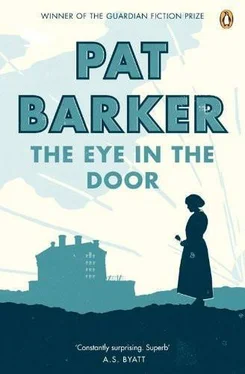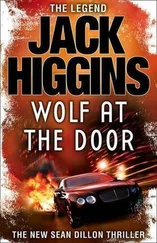Rivers waited. When it was clear Prior could offer nothing more he said, ‘You say the worst feature of their situation is the eye?’
‘Yes.’
‘The constantly being spied on?’
‘Yes.’
Rivers asked gently, ‘In that meeting with Mrs Roper, who was the spy?’
‘I —’ Prior’s mouth twisted. ‘I was.’
Another pause. Rivers prompted. ‘So?’
‘So ,’ Prior said in a disgusted singsong, jabbing with his index finger, ‘“eye” was stabbing myself in the “I”. And God knows one wouldn’t want a reputation for puns like that!’
A pause. Rivers asked, ‘What do you think about that? Does it seem…’
‘It’s possible, I suppose. I hate what I do. And I suppose I probably felt I was in a false position. Well, obviously I did, I’d have to be mad not to.’
‘I want you to do something for me,’ Rivers said. ‘I want you to write down any dreams you have that are as… as bad as this one. Just record them. Don’t try to interpret. And send them to me. I’ll be seeing you again on—’
‘No, I’m sorry, I can’t. It’ll have to be the following week. If that’s all right? I’m going to see Hettie Roper.’
‘Back to Salford? Where will you be staying?’
‘At home.’ He pulled a face. ‘Yes, I know. How can I stay anywhere else?’
Rivers nodded. He was remembering a visit of Prior’s parents to Craiglockhart. In one afternoon they’d undone every slight sign of progress and precipitated an asthmatic attack. ‘Does your father know what you’re doing? I mean, does he know what the job involves?’
‘My God, I hope not.’ Prior shifted restlessly. ‘This is a dirty little war, Rivers. I can honestly say I’d rather be in France.’
‘Yes. I’m sure you would.’
Prior gave him a sharp look. ‘You’re worried, aren’t you? Why? Because I’m going home?’
‘No, not particularly.’
‘Oh, I see . Yes. It was a suicide dream.’ His expression changed. ‘You needn’t worry. If anybody comes a cropper over this one, it will not be me. ’
He looked quite different, suddenly: keen, alert, cold, observant, detached, manipulative, ruthless. Rivers realized he was seeing, probably for the first time, Prior’s public face. At Craiglockhart he’d been aggressive and manipulative, but always from a position of comparative helplessness. At times he’d reminded Rivers of a toddler clinging to his father’s sleeve in order to be able to deliver a harder kick on his shins. Now, briefly, he glimpsed the Prior other people saw: the Lodes, the Ropers, the Spragges, and it came as a shock. Prior was formidable.
Against a yellow backcloth a woman draped in brilliant green veils writhed and twisted. She looked like an exotic lizard or a poisonous snake. That, apparently, had been Wilde’s intention. Robert Ross had been telling them about it before the performance, recalling a day in Paris, Wilde darting across the boulevards to look in shop windows, asking, ‘What about that?’ or ‘Or perhaps she should be naked except for the jewels?’ Yellow and green was his colour scheme, though Wilde could not have foreseen what, for Charles Manning, was its most disturbing feature: that the yellow was the exact shade of munition girls’ skins. Others wouldn’t notice that, of course. It only struck him because one of his duties at the Ministry was to serve as the military member on a committee set up to inspect the health and safety standards of munitions factories. One saw row after row of such girls, yellow-skinned, strands of ginger hair escaping from under their green caps, faces half hidden by respirators.
Ross had been quite interesting on Wilde’s plans for Salome , rather more interesting than the performance so far. The most startling piece of information was that Wilde himself had once played Salome, which did rather boggle the imagination, since in photographs he looked far from sylph-like, even by the normal standards of prosperous middle-aged men. Manning directed his attention back to the stage. Since he’d made the effort to attend — and it had been an effort, he was feeling very far from well — he ought at least to give the play a chance, particularly since it had obviously meant a great deal to Wilde. Iokanaan’s head had been brought in on a charger and Salome was kneeling, hands outstretched towards it. Manning felt an unexpected spasm of revulsion, not because the head was horrifying, but because it wasn’t. Another thing Wilde couldn’t have foreseen: people in the audience for whom severed heads were not necessarily made of papier mâché.
Salome began to fondle the head. ‘Ah! thou wouldst not suffer me to kiss thy mouth, Iokanaan. Well! I will kiss it now. I will bite it with my teeth as one bites a ripe fruit. Yes, I will kiss thy mouth, Iokanaan. I said it: did I not say it? I said it. Ah! I will kiss it now.’
Manning was bored. If he were honest all this meant nothing to him. He could see what Wilde was doing. He was attempting to convey the sense of a great passion constricted, poisoned, denied legitimate outlets, but none the less forced to the surface, expressed as destruction and cruelty because it could not be expressed as love. It was not that he thought the theme trivial or unworthy or out of date — certainly not that — but the language was impossible for him. France had made it impossible.
He’d only to think for a second of the stinking yellow mud of the salient, that porridge in which the lumps were human bodies, or parts of them, for an impassable barrier to come between his mind and these words.
A line of men in gas masks clumps along the duckboards. Ahead of the marching column what looks like a lump of mud sticks to the edge of the track. Closer, it turns out to be a hand. Clumping feet. His own breathing harsh inside the respirator, and then wriggling worm-like across the mud, a voice, sly, insinuating, confidential: ‘Where’s Scudder? Where’s Scudder? Where’s—’
On stage another question was being asked: ‘But wherefore dost thou not look at me, Iokanaan? Thine eyes that were so terrible, so full of rage and scorn, are shut now. Wherefore are they shut?’
He’s dead, for Christ’s sake , Manning thought. His knee had gone into spasm, and he was in acute pain. He glanced sideways at Ross, whose gaze was fixed on the stage, registering every nuance of the performance. He looked ill. Even in this golden reflected light, he looked ill. Oh, God, Manning thought, I wish this was over.
At last Herod cried, Kill that woman! and the soldiers rushed towards Salome, daughter of Herodias, and crushed her beneath their shields.
A moment’s silence, then the applause burst out and Maud Allan, impersonal beneath the heavy make-up, was curtsying, blowing kisses, smiling, the severed head dangling from one small white hand.
Ross was surrounded as soon as the lights went up. Manning pushed through and shook hands with him, added his murmur to the general buzz of congratulation, then pointed to his knee, and to the back of the auditorium. Ross nodded. ‘But you will come backstage?’
Pushing against the crowd to get to the top exit, Manning realized how painful his leg was. He opened the door marked — FIRE EXIT and went through. A stone corridor, dimly lit, stretched ahead of him, with none of the gilt and plush of the rest of the theatre. The men’s lavatory was at the end of the corridor, down a short flight of stairs. He peed, and then lingered over the business of washing his hands, wanting to postpone the moment when he would have to go backstage and swap the usual chit-chat. He would much rather have gone home. He was sleeping in his own house again, making the need to keep an eye on the builders his excuse, though he was glad of the chance to get away from the club. That silly incident, the newspaper clipping sent to his house, had disturbed him, simply because it could have been sent by anybody . He no longer felt he could trust people, members of his club, people he worked with. Even tonight his unwillingness to attend had not been primarily from fear of being seen with Ross — though that was a factor — so much as from simple reluctance to mix. Perhaps he was becoming too much of a recluse. Rivers certainly seemed to think he was.
Читать дальше












